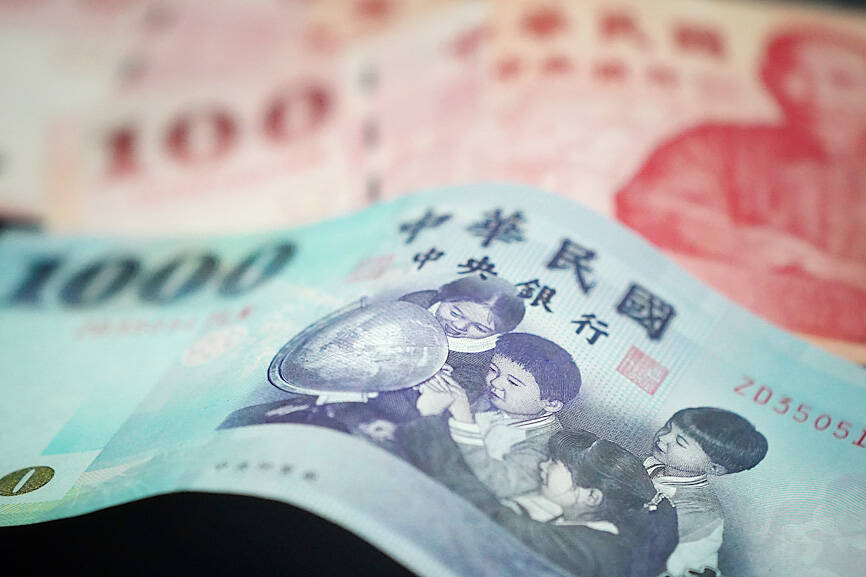Average monthly wages in the local industrial and services sectors in February rose 3.02 percent year-on-year to NT$47,296, while total wages — including bonuses and overtime pay — dropped 28.74 percent to NT$58,182, skewed by the timing of the Lunar New Year holiday, the Directorate-General of Budget, Accounting and Statistics (DGBAS) said yesterday.
Despite the sharp annual decline in total compensation, the data indicate a continued upward trend in Taiwanese workers’ wages, DGBAS Census Department Deputy Director Tan Wen-ling (譚文玲) said.
The timing of the Lunar New Year holiday — which fell mainly in January this year, but entirely in February last year — contributed to the discrepancy, she added.

Photo: CNA
In the first two months of the year, average real regular wages rose 0.81 percent year-on-year to NT$43,380 after adjusting for inflation, the fastest growth in four years, Tan said.
Real total wages also grew 0.85 percent to NT$154,709, the second-highest increase over the same period, she said.
This is the 11th consecutive month in which wage growth outpaced inflation, Tan said.
Median regular wages — considered a more accurate reflection of typical pay, as they are not skewed by extremely high or low wages — rose 2.89 percent year-on-year to NT$37,986 in February, the DGBAS said. The figure was NT$38,062 in the first two months of this year, up 2.93 percent year-on-year, it said.
Meanwhile, the average overtime hours in the industrial and service sectors in February hit 8.4 hours, up 0.5 hours from a year earlier, the agency said.
In addition, overtime hours in the manufacturing sector reached 16.1 hours in February, extending a nine-month streak of positive growth, while the electronics components industry reported 26.9 overtime hours, the second-highest figure on record, the agency added.
The increase was driven in part by continued gains among Taiwanese technology firms, which have benefited from the development of artificial intelligence by major US technology giants, Tan said.
However, it is difficult to determine whether the rise in overtime hours and manufacturing activity was driven by front-loading of shipments, she added.
In the first two months, the average overtime hours in the industrial and service sectors were 8.5 hours, up 0.5 hours from the same period last year, the agency's data showed.
The DGBAS also estimated that average year-end bonuses in the local industrial and services sectors will rise to 1.72 months of regular salary this year, with the financial and insurance sector receiving the highest bonuses, averaging 3.74 months of regular salary.
The manufacturing sector followed with 2.17 months, trailed by the transportation and warehousing sector at 1.97 months and the real estate industry at 1.92 months, the agency said.

STEEP DECLINE: Yesterday’s drop was the third-steepest in its history, the steepest being Monday’s drop in the wake of the tariff announcement on Wednesday last week Taiwanese stocks continued their heavy sell-off yesterday, as concerns over US tariffs and unwinding of leveraged bets weighed on the market. The benchmark TAIEX plunged 1,068.19 points, or 5.79 percent, to 17,391.76, notching the biggest drop among Asian peers as it hit a 15-month low. The decline came even after the government on late Tuesday authorized the NT$500 billion (US$15.2 billion) National Stabilization Fund (國安基金) to step in to buoy the market amid investors’ worries over tariffs imposed by US President Donald Trump. Yesterday’s decline was the third-steepest in its history, trailing only the declines of 2,065.87 points on Monday and

TAKING STOCK: A Taiwanese cookware firm in Vietnam urged customers to assess inventory or place orders early so shipments can reach the US while tariffs are paused Taiwanese businesses in Vietnam are exploring alternatives after the White House imposed a 46 percent import duty on Vietnamese goods, following US President Donald Trump’s announcement of “reciprocal” tariffs on the US’ trading partners. Lo Shih-liang (羅世良), chairman of Brico Industry Co (裕茂工業), a Taiwanese company that manufactures cast iron cookware and stove components in Vietnam, said that more than 40 percent of his business was tied to the US market, describing the constant US policy shifts as an emotional roller coaster. “I work during the day and stay up all night watching the news. I’ve been following US news until 3am

Six years ago, LVMH’s billionaire CEO Bernard Arnault and US President Donald Trump cut the blue ribbon on a factory in rural Texas that would make designer handbags for Louis Vuitton, one of the world’s best-known luxury brands. However, since the high-profile opening, the factory has faced a host of problems limiting production, 11 former Louis Vuitton employees said. The site has consistently ranked among the worst-performing for Louis Vuitton globally, “significantly” underperforming other facilities, said three former Louis Vuitton workers and a senior industry source, who cited internal rankings shared with staff. The plant’s problems — which have not

TARIFF CONCERNS: The chipmaker cited global uncertainty from US tariffs and a weakening economic outlook, but said its Singapore expansion remains on track Vanguard International Semiconductor Corp (世界先進), a foundry service provider specializing in producing power management and display driver chips, yesterday withdrew its full-year revenue projection of moderate growth for this year, as escalating US tariff tensions raised uncertainty and concern about a potential economic recession. The Hsinchu-based chipmaker in February said revenues this year would grow mildly from last year based on improving supply chain inventory levels and market demand. At the time, it also anticipated gradual quarter revenue growth. However, the US’ sweeping tariff policy has upended the industry’s supply chains and weakened economic prospects for the world economy, it said. “Now